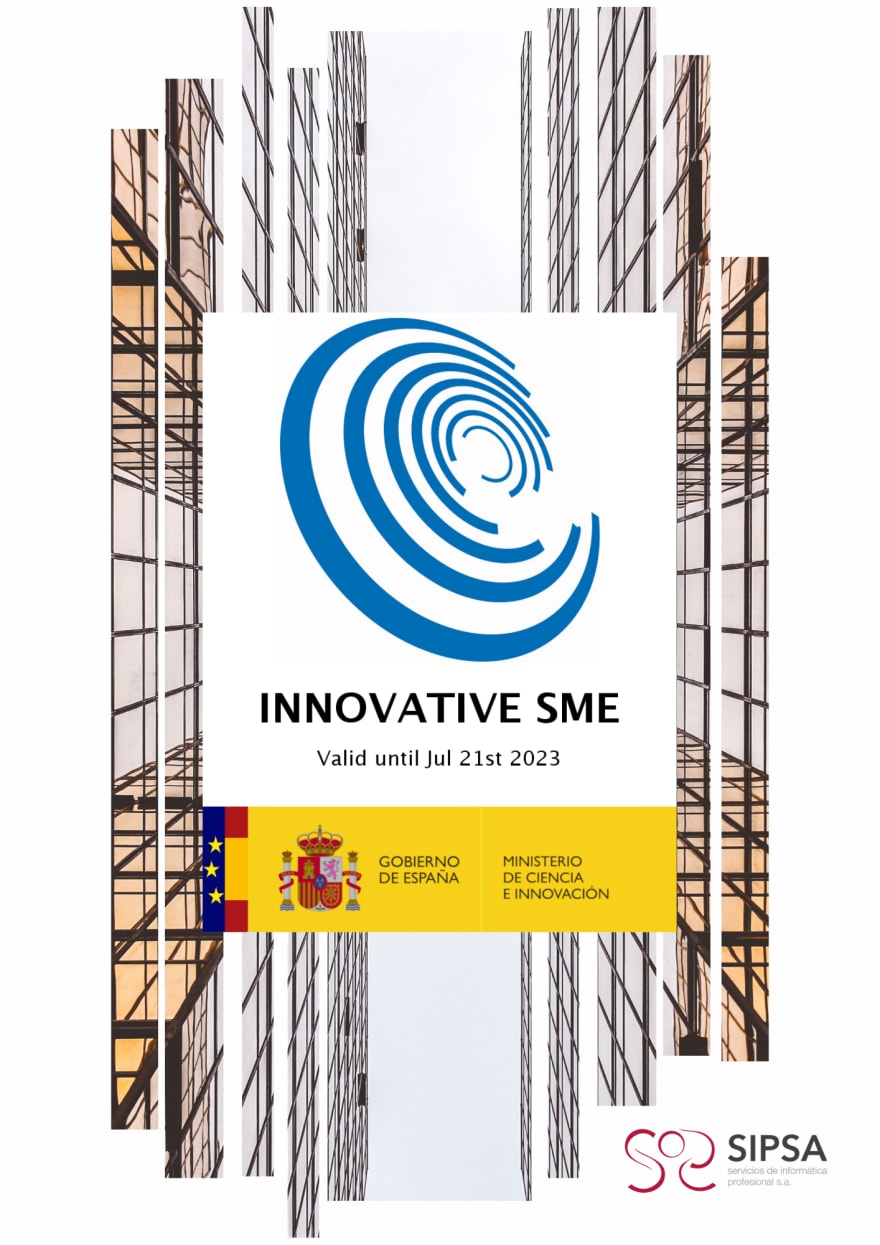SIPSA, IT Spanish Service Company.
Since its creation in 1985 SIPSA has brought to the market skilled professionals that, using the most advanced technological innovations, are able to solve information and communication problems that are faced by business´s on a daily basis.
The Spanish Government recognises SIPSA as a leading innovative company with the acreditation of the SME seal, awarded by the Ministry Science and Innovation.
At SIPSA we consider that innovation is one of the most important ways to assist our clients in meeting their business objectives. This seal is further recognition of both our ongoing commitment to development and innovation of new technologies, our highly qualified team of professionals, with special recognition to TAST (Test Automation System Tool) as a Technological Innovation Project, SIPSA´s Proprietory Testing Tool.
Experience shows us that the quality of Software Development projects is compromised due to variations in time and cost, whilst aiming to maintain the defined functionality. The maintenance of these four factors aligned, in a reality of deviations from the initial plan, is achieved through the Automation of the Test Process.
SIPSA´s TAST (Test Automation System Tool), is a readily available and complete Framework for the Definition, Planning and Execution of Automatic Tests available as SaaS as well as on premise.
Amongst the services offered by SIPSA, such as TAF, our Test Automation Factory, TAST is also available as a Service solution (TaaS) based on and adapted to the specific needs of each Project. The Customer does not have to worry at any point in the testing process whilst working with our team of experts who will take care of everything.
An area of great importance in Testing and which we want to concentrate on here is that of mobile testing, as well as the benefits that test automation delivers.
WHY MOBILE TESTING IS IMPORTANT.
Mobile Application Testing enables enterprises to build applications that are scalable and accessible across multiple platforms. It’s a process to build an application software by testing it for its functionality, usability, and consistency. Mobile applications are growing in complexity and there is a greater need for end-to-end testing. These applications are different from traditional web and desktop applications, requiring a different approach in its construction. This approach should generate reliability in the end user, who can be anyone using a smartphone. Such a situation entails new challenges for those developing mobile apps.
Application security is becoming increasingly important, and developers must find new ways to review and test the content, so that applications can be debugged before deploying to the market, to avoid mistakes. It is important to state that not only security is important, but there are also other attributes that need to be evaluated, such as performance.
However, learning how to test software it is not as simple as it may appear. This is where TaaS (Test as a Service) supports the business in its approach to effectively tests mobile applications using automation. The client does not have to worry about anything our team can take care of the entire testing process or to provide support on specific phases according with the needs of each project.
MOBILE TESTING CHALLENGES.
1.Mobile app testing is notoriously complex. With so many devices and operating systems variations, with different functionalities across them all. Mobile app testing is more complicated than web testing. Mobile apps usually have more users and need to work on a broader range of devices. They also have more functionalities than web apps. And of course, all of this functionality must be tested. On top of this, the mobile market remains incredibly fragmented. The diversity of iOS and Android devices change rapidly and continuously. Keeping up with new models and new operating systems is challenging, especially for Android. The sheer volume of tests needing to be executed can be daunting for teams. The key here to keeping up with the ever-changing mobile market is through automated testing, TAST.
2.Testing the Mobile App or Web service in different Operational Scenarios is key to obtain real user experience. Examples on different SUT Operational Scenarios to be tested includes:
Type of network. Test should be carried out in cases such as Wifi access, Mobile network access (5G, 4G, 3G).
Concurrency with other Mobile Apps. User will not have the same response when only one app is running than other scenarios when it runs in concurrency with others (ex. Facebook, Instagram, Mail, Youtube, Whatsapp, etc.) as the CPU usage, as well as the network capacity, can be seriously affected.
Real user condition testing of mobile apps is critical. By applying environmental and device conditions to your app testing, it gives you a truer look of what the end user experiences once your app is released. And fortunately, real user simulation testing can be automated.
The digital platforms that consumers use are complex. You need to recreate specific user environments as much as you can in your test environment. By taking a set of tests that run against a given number of devices on a functional level and factoring in real user conditions, you enhance your test coverage. You add more depth to your testing and increase the likelihood of meeting your user expectations.
3.Security. Today we cannot make a transfer or an online payment without going through the authentication of the transaction on our smartphone. They are part of our identity, either with our fingerprint, facial recognition or electronic signature with authorization codes. Most new platforms require mobile authentication for security reasons which makes mobile testing necessary to test E2E system capabilities , resulting in more secure, efficient products and enhanced user experiences.
BENEFITS OF MOBILE AUTOMATION TESTING WITH TAST.
1.Easy regression testing.
2.Performance of extensive system testing sessions in a fast and efficient way.
3.Reducing test execution times.
4.Test Cases already defined that you could reuse and mobile adaptor that allows multiple executions.
5.Manage data generation. We can generate many test cases that generate a large amount of data, results. With automation we can properly manage this amount of data and analyse it.
6.TAST integrates Appium. Appium is an open source framework for mobile app testing. It supports end-to-end testing in multiple languages.
7.TAST, cloud solution testing tool. Cloud Technology helps save costs related to infrastructure and boosts the quality of the apps. Implementing Cloud Technology for testing mobile apps bring tremendous benefits, ensuring quality and getting apps faster to the market. Using this technology is business critical for testing applications today, as testing has to be performed for scalability across various platforms, devices, and operating systems. Everything has to be taken into account to avoid post-launch issues for consumers to avoid incurring costs to rectify them.






Top comments (1)
The Hyundai check engine light serves as a crucial indicator of potential issues within the vehicle's engine system. When this light illuminates on the dashboard, it signals that the vehicle's onboard diagnostic system has detected a malfunction or irregularity, which requires immediate attention from a certified technician.